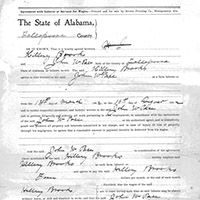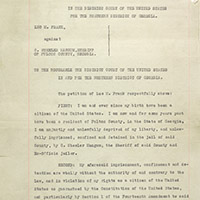[table striped="true" responsive="true"]
[/table]
Early Gains and Losses |
It is debatable if one can call the Emancipation Proclamation a "Civil Rights" document since it freed no one at the time President Lincoln issued it, but its most immediate impact was the influx of African Americans into the Union Army. After the Civil War, three amendments were added to the U.S. Constitution ending slavery (the 13th), defining citizenship (the 14th), and protecting voting rights (the 15th). Hundreds of federal court cases from South Carolina document the federal government's attempt to enforce these voting rights in the 1870 congressional elections. The Civil Rights Act of 1875 guaranteed equal access to public facilities; however, in 1883, the Supreme Court ruled it unconstitutional. This Supreme Court ruling, along with another one in 1896, neutralized the gains made in Civil Rights during the years immediately following the Civil War. Thus began the Jim Crow era in the South, where a system of peonage, lynching, and other gross civil rights violations became a way of life. |
[table striped="true" responsive="true"]
[/table]
 |
[table striped="true" responsive="true"]
[/table]
 |
 |
 |
 |
 |
 |
[table striped="true" responsive="true"]
[/table]
 |
 |
[table striped="true" responsive="true"]
[/table]
- 5780 Jonesboro Road
- Morrow, GA 30260
- (770) 968-2100
- atlanta.archives@nara.gov
- Monday to Friday
- 8:30 a.m. to 5:00 p.m.



